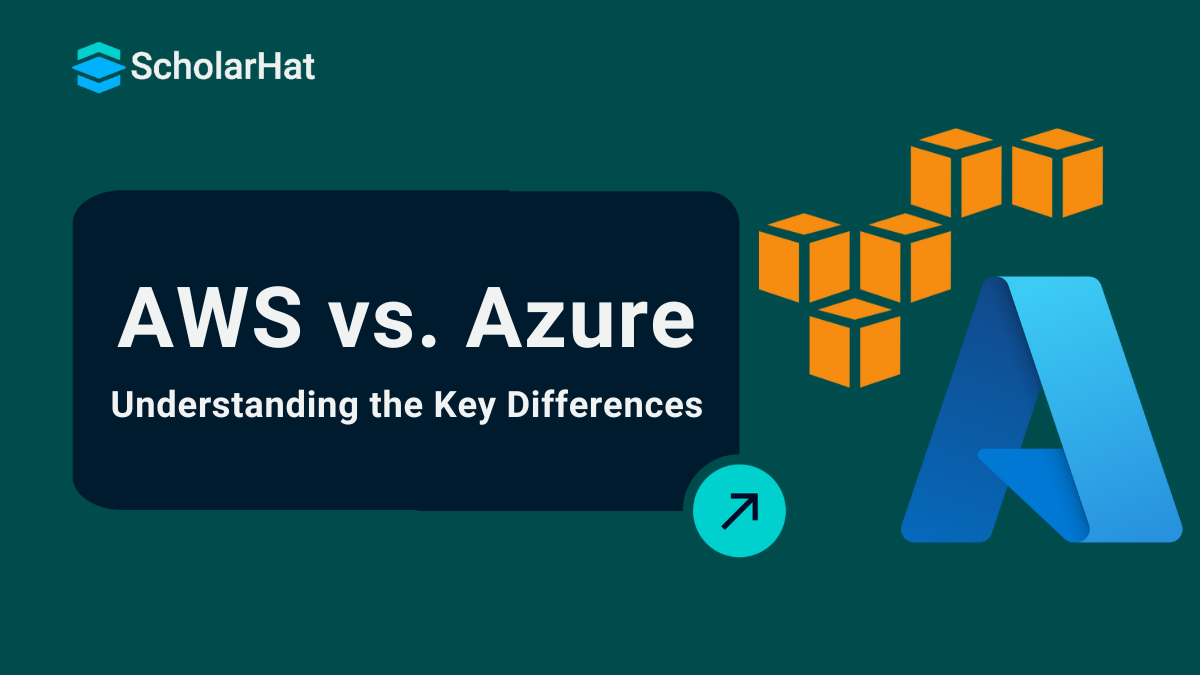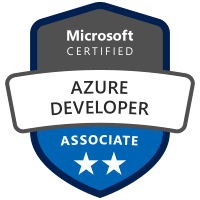25
AprAWS vs. Azure: Key Differences between AWS and Azure
AWS and Azure
AWS and Azure are leading cloud service providers offering comprehensive solutions for computing, storage, and networking. AWS, known for its extensive global reach and mature ecosystem, provides a wide range of services and flexibility for various workloads. Azure, integrated closely with Microsoft products and services, offers strong support for enterprises and hybrid cloud environments. Both platforms are powerful, but the choice between them often depends on specific business needs, existing infrastructure, and preferred tools and technologies.
In this Azure Tutorial, we are going to see the Key Differences between AWS and Azure including What is AWS? What is Azure? AWS Vs Azure with different parameters.
What is AWS?
- AWS stands for Amazon Web Services which was launched in 2002.
- AWS is the world’s driving supplier of cloud services, giving IT infrastructure arrangements as per demand for companies of all sizes.
- Companies like Expedia, Netflix, Hulu, Spotify, and Ubisoft trust AWS to innovate and manage their system workload to run.
- AWS provides more than 100 services on a pay-as-you-go pricing model. AWS has the biggest and most energetic community, with millions of dynamic clients.
What is Azure?
- Microsoft Cloud commonly referred to as Azure is a public, private & hybrid cloud computing platform provided by Microsoft and launched in the mid-2000s.
- It empowers you with a wide range of cloud services which helps in data storage, analytics, virtual computing, software development, deploying production-ready applications, and making them accessible on the global network.
- It also enables you with various tools and frameworks to meet your business goals.
- If you're modern to the world of cloud computing, you may need to choose a cloud computing platform that can assist you effortlessly get begun with cloud computing.
- It is greatly vital for one to familiarize themselves with different driving cloud benefits given by available cloud providers.
- Cloud computing is the stage of choice in today’s world of modern software development.
- AWS, Azure, Google, IBM, Alibaba, oracle are the available cloud computing platform.
- Among these, AWS and Azure have the majority of the market share. So, let's understand the key differences between Azure and AWS.
| Read More: What is Cloud Computing? |
Key Differences between AWS and Azure
The following are the 5 main factors that can differentiate AWS and Azure
1. Computer Services
| AWS | EC2 | Elastic Beanstalk (PAAS) | AWS Lambda (Serverless) |
| Azure | Virtual Machine | App Service (PAAS) | Azure Functions (Serverless) |
2. Networking
| AWS | VPC | Direct Connect | Route 53 | ELB | Cloud Front |
| Azure | Virtual Network | ExpressRoute | Azure DNS | Azure Load Balancer | CDN |
3. Storage Services
| AWS | S3 | SQS | EFS | Amazon Glacier |
| Azure | Blob Storage | Queue storage | File Storage | Azure Backup |
4. Database Services
| AWS | RDS | Dynamo DB | Redshift |
| Azure | SQL | Document DB | SQL Data Warehouse |
5. Price Calculator
If you follow the pricing war between cloud computing providers, then you will notice that prices are continuously falling down. Both provide a price calculator that helps you to estimate the cost of the services you are planning to use. Pricing may get complex sometimes. You can try their services under the free tier.
| AWS price calculator |
| Azure price calculator |
6. Container and Orchestration Support
- AWS has fully managed services like Amazon Elastic Container Registry (ECR), Amazon Elastic Container Service (ECS), and Amazon Elastic Kubernetes Service (EKS) to support the orchestration of the containerized application.
- Azure has Azure Kubernetes Service (AKS) to make app deployment and management easy. Container Registry to store and manage container images. Service Fabric supports microservices development and orchestration to run containers securely.
7. Compliance
AWS has compliance certification offerings like CSA, ISO 9001, FISMA, HIPAA, GDPR, PCI DSS CJIS, FIPS, and more. You can check the latest list by visiting
| AWS Compliance Program |
Azure has more than 90 compliance certification offerings like HIPAA, GDPR, PCI DSS CJIS, FIPS, and more. You can check the latest list by visiting
| Azure Compliance Program |
8. Integrations and Open Source Community
- AWS has better interoperability with open-source communities like Jenkins, GitHub, and Linux.
- Azure works well and has better native integration with Microsoft tools and technologies. Azure is catching up rapidly with open source community tools and technologies.
9. Support Plans
AWS has a range of Developer, Business, and Enterprise support plans. You can check them by visiting
| AWS Support Plans |
Azure has support for Basic, Developer, Standard, and Professional direct plans. You can check them by visiting
https://azure.microsoft.com/en-in/support/plans/
Licensing
AWS supports different types of licensing options. You can buy new customer licenses or BYOL i.e. ‘bring your own license’. For more information, please visit
"https://aws.amazon.com/windows/faq/#licensing"
Azure license allows you as an Administrator to add a user account to use cloud offerings and a subscription account gets charged monthly. You can understand more about license mobility through Software Assurance by visiting
"https://azure.microsoft.com/en-us/pricing/license-mobility/"
Hybrid Cloud Capabilities
- AWS is upgrading and constantly adding hybrid cloud capabilities by adding new services like Snowball Edge.
- Azure has strong hybrid cloud capabilities with platforms like Azure Stack which lets you get public Azure functionalities to your on-premises data centers.
AWS Vs. Azure: Other factors with differences
| Parameter | AWS | Azure |
| Launched year | 2006 | 2010 |
| Availability Zones | 60+ | 140+ |
| Pricing | Per hour billing | Per minute billing |
| Cache | Elastic cache | Redis cache |
| Application Testing | Device farm | DevTest labs |
| Kubernetes | Elastic Kubernetes Services (AKS) | Azure Kubernetes Services (AKS) |
| API Management | Amazon API Gateway | Azure API Gateway |
| Media Services | Amazon elastic transcoder | Azure Media Services |
| Artificial Intelligence | Lex, Polly, SegeMaker, AML, TensorFlow | Machine Learning Studio, Bot Services, Cognitive Services |
| Internet of Things (IoT) | IoT platform GreenGrass | IoT Hub, EventHubs |
| Analytics | Athena, EMR, Kinesis | Stream Analytics, HDInsight |
AWS Advantages
- AWS Provides a wide and growing array of cloud offerings and services.
- AWS provides, Customizable compute services that let you choose platform/framework/programming languages, etc.
- AWS provides, Great support for business intelligence and data analytics.
- AWS is available for open source development and many programs by major software vendors are available on the AWS platform.
- AWS Offers flexibility for integrating third-party tools.
- Its Data centers are available across the globe.
- AWS has a Virtual Private Cloud.
AWS Disadvantages
- AWS is less open to third-party or private cloud providers.
- Due to too many available service options, it’s difficult for customers to make the right choice as per business needs.
- Requires technical background due to which AWS lacks in customer support services and one must spend on enterprise-level support.
- The AWS cost structure is difficult to understand.
Azure Advantages
Azure Disadvantages
Conclusion
AWS and Azure are Both Cloud computing platforms that are well equipped with powerful capabilities, new integration, new products, and changing pricing structures. AWS and Azure hold the majority of the market share and constantly upgrading. Azure is incredible when it comes to hybrid cloud computing and Microsoft technology stack, while AWS has more adaptability with open source technology eco-system and additional highlights. You can choose it according to project requirements. Also, consider our Azure training to help you earn Azure real-time focused Hands-on skills and get Azure certification.
FAQs
Take our Azure skill challenge to evaluate yourself!

In less than 5 minutes, with our skill challenge, you can identify your knowledge gaps and strengths in a given skill.








